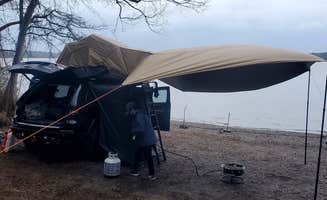Dispersed camping near Saluda, Virginia primarily occurs within the region's wildlife management areas (WMAs), located across the coastal plains of tidewater Virginia. These primitive camping options require minimal planning but demand self-sufficiency in an area dominated by tidal wetlands and coastal forest ecosystems. Winter temperatures typically range from 30-50°F while summer months average 75-90°F with high humidity, making seasonal preparation essential for campers.
What to do
Fishing access points: At Chickahominy Wildlife Management Area, waterfront parking spots provide excellent fishing opportunities. "Basic parking spot in quite location. Weekends some hunters and shooting range close by in other side. It's 2 parking side by water and some other ones on the way while driving," notes camper GoGo.
Shoreline exploration: The natural shorelines along the James River offer opportunities for wildlife viewing during dawn and dusk hours. Winter visitors to Eagle Nest Lookout report "Car camped here 5 feet from the water. There is a large shoreline area to Car camp and right up the hill is a nice tent site as well overlooking the river," according to Kevin F.
Hiking trails: Several unmarked paths throughout the wildlife management areas provide hiking options, particularly in the cooler months. "The scenery is spectacular alongside the Chickahominy River and a great place to for hiking," shares Greg S., though noting that noise from nearby shooting ranges can affect the experience.
What campers like
Waterfront proximity: Campers appreciate the ability to set up directly beside the water. Kurt S. shares, "I arrived with a small (18') trailer and put it within 5' of the water. Since it's a WMA you can set up anywhere but this place has about 15 cleared areas any one of which I would have been happy with."
Budget-friendly options: Virginia residents with valid fishing or hunting licenses can access free 14-day camping, while others pay minimal fees. "You can purchase $4 daily pass or if Virginia residents free 14 days camping complementary as well with any fishing license or hunting license if you have," explains one visitor to Ware Creek Wildlife Management Area.
Privacy opportunities: Despite occasional busy periods, many campers find solitude. "Definitely a busy little spot but we ended up having the place to ourselves once the all the people Fishing left," reports a winter camper at Eagle Nest Lookout.
What you should know
Seasonal visitor patterns: Weekends bring increased activity, especially from hunters and fishermen. One camper noted, "There weren't very hospitable to say the least. One releaved him self at his truck on the side We were on and moved on the side with the larger group of cars, truck and campers."
Noise considerations: Several campers report unexpected noise from nearby shooting ranges and other visitors. "To add insult to injury this group ran their generators up until 4:30 am. Very uncool and inconsiderate. Be aware that you will be able to hear the shooting range up till the evening," warns Greg S.
Trash management: Unfortunately, trash can be an issue at these primitive sites. Kevin F. reports, "Trash was present but we walked around and picked up," highlighting the importance of both proper disposal and community cleanup efforts.
Tips for camping with families
Clear marked sites: For families, the multiple cleared areas at Chickahominy WMA provide easier setup options. "As a bonus there is a raised area—about 20' above the drivable area—that would be perfect for a campfire and a tent or two," notes Kurt S., describing an ideal family camping setup.
Weather preparedness: The coastal location experiences rapid weather changes, requiring families to bring appropriate gear. Garrett G. advises visitors to "Take advantage of your local wildlife areas" but notes varying conditions throughout the seasons.
Time planning: Arrival timing matters for securing preferred spots. One camper recommends arriving mid-week rather than weekends for quieter experiences, noting "In my opinion these areas are not necessarily the best place for quiet secluded camping. There are other areas though."
Tips from RVers
Vehicle size limitations: Most sites accommodate only small trailers or vans. Kurt reports success with "a small (18') trailer" at Chickahominy WMA, but larger RVs will struggle with access and turnaround space.
Leveling challenges: The natural terrain requires leveling blocks and preparation. The sites lack formal pads or designated parking areas, so RVers should bring leveling equipment and stabilizers for comfort.
Generator etiquette: Without established quiet hours, generator use can create conflict. One camper noted others "ran their generators up until 4:30 am," suggesting RVers should be considerate about power generation to maintain goodwill among fellow campers.


